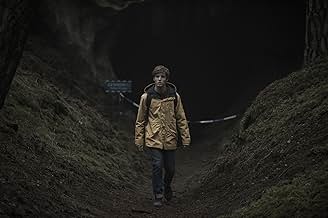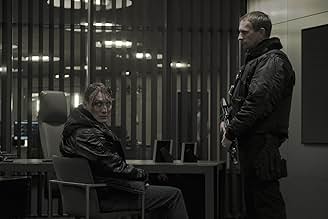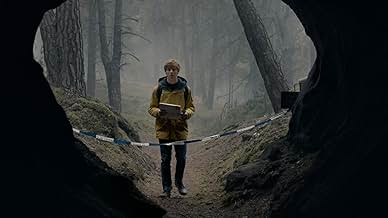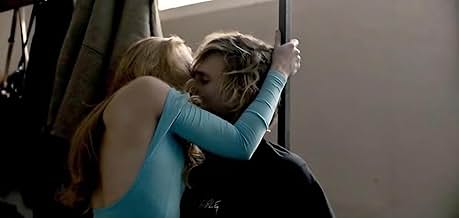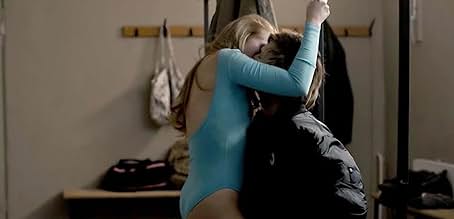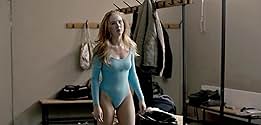Bizarre occurrences give Charlotte a sense of déjà vu, and she suspects Peter is hiding something. Franziska snaps when Magnus confronts her.Bizarre occurrences give Charlotte a sense of déjà vu, and she suspects Peter is hiding something. Franziska snaps when Magnus confronts her.Bizarre occurrences give Charlotte a sense of déjà vu, and she suspects Peter is hiding something. Franziska snaps when Magnus confronts her.
- Director
- Writers
- Stars
Gina Stiebitz
- Franziska Doppler
- (as Gina Alice Stiebitz)
- Director
- Writers
- All cast & crew
- Production, box office & more at IMDbPro
8.114.9K
1
2
3
4
5
6
7
8
9
10
Featured reviews
Effective filmmaking despite some implausibilities
The mystery continues a slow burn with more eerie moments and character establishment.
There have been comparisons made to the work of David Lynch and I feel it clearly in this one. I feel the underlying dark secrets lurking below the surface of the community as if they were barrels of toxic nuclear waste. This makes it quite compelling and makes me want to find out more.
I used the word "implausibility" loosely in the review title, as this is after all sci-fi fantasy, so it's best not to take certain plot details too seriously. In this I refer to certain aspects of behaviour shown that make characters fit the "too stupid to live" trope and (if it exists) the similar one I call "too stupid to be parents". Given the premise established in the previous episode, we see instances of characters wandering alone in the woods, walking alone or causing young children to be in a position of having to walk home alone. Some of this is a stretch and requires a liberal suspension of disbelief.
As in the previous episodes the cinematography, lighting, art design and sounds come together to create a tremendously effective atmosphere.
I rate this one as a 7.5/10, but like to round upwards.
There have been comparisons made to the work of David Lynch and I feel it clearly in this one. I feel the underlying dark secrets lurking below the surface of the community as if they were barrels of toxic nuclear waste. This makes it quite compelling and makes me want to find out more.
I used the word "implausibility" loosely in the review title, as this is after all sci-fi fantasy, so it's best not to take certain plot details too seriously. In this I refer to certain aspects of behaviour shown that make characters fit the "too stupid to live" trope and (if it exists) the similar one I call "too stupid to be parents". Given the premise established in the previous episode, we see instances of characters wandering alone in the woods, walking alone or causing young children to be in a position of having to walk home alone. Some of this is a stretch and requires a liberal suspension of disbelief.
As in the previous episodes the cinematography, lighting, art design and sounds come together to create a tremendously effective atmosphere.
I rate this one as a 7.5/10, but like to round upwards.
This episode is pivotal in its exploration of duality-both in the characters' hidden lives and the series' overarching themes of time and identity
"Doppelleben" (Double Lives), the fourth episode of Netflix's Dark Season 1, directed by Baran bo Odar and created by Odar alongside Jantje Friese, deepens the series' intricate narrative by focusing on the complex dynamics within the Doppler family and expanding the web of secrets enveloping the town of Winden. This episode is pivotal in its exploration of duality-both in the characters' hidden lives and the series' overarching themes of time and identity-while maintaining the show's signature atmospheric tension and narrative complexity.
The episode centers on the Doppler household, introducing Elisabeth Doppler, a deaf young girl whose presence adds emotional depth and a new perspective to the unfolding mystery. The strained relationship between her parents, Charlotte Doppler-the town's police chief-and Peter Doppler, who is revealed to be struggling with his sexuality and leading a secret life, forms a core emotional thread. Charlotte's growing sense of déjà vu and suspicion towards Peter's behavior adds layers of interpersonal tension and foreshadows deeper revelations. This domestic drama is interwoven with the broader mystery, as the Doppler family's secrets mirror the town's concealed histories.
Parallel to the family dynamics, the episode follows the younger characters' attempts to unravel the mysteries surrounding the caves and the nuclear power plant. Franziska Doppler's confrontation with Magnus Nielsen, her boyfriend, highlights the fraught nature of adolescent relationships amidst the town's turmoil. The discovery of a mysterious metal box near the railroad tracks, containing a large envelope of money, introduces a new element of intrigue and suggests the presence of clandestine operations beneath Winden's surface. These plot developments enrich the narrative's complexity and heighten suspense.
Baran bo Odar's direction continues to impress with its meticulous attention to atmosphere and tone. The muted color palette, combined with precise framing and shadow play, evokes a sense of claustrophobia and unease that permeates the episode. The cinematography captures intimate character moments alongside the eerie natural settings, such as the woods and the ominous caves, reinforcing the series' thematic interplay between the personal and the supernatural. The editing skillfully balances multiple storylines, maintaining narrative clarity amid the dense temporal and relational shifts.
The performances in "Doppelleben" are compelling and nuanced. Karoline Eichhorn as Charlotte Doppler conveys a blend of authority, vulnerability, and growing suspicion that anchors the episode emotionally. The young actors, including Lisa Vicari as Martha Nielsen and Luise Heyer as Franziska, navigate their characters' emotional complexities with authenticity, particularly in scenes depicting adolescent angst and rebellion. The ensemble cast's ability to embody the layered secrets and tensions within their relationships enhances the episode's immersive quality.
The episode delves into the concept of duality-literal and metaphorical double lives-as characters grapple with hidden desires, secrets, and the tension between appearance and reality. It explores the impact of secrecy on familial relationships and the broader community, reflecting on how concealed truths shape identity and destiny. The motif of déjà vu experienced by Charlotte underscores the series' preoccupation with time's cyclical nature and the haunting persistence of the past.
Dark stands out in contemporary television for its sophisticated blend of science fiction, mystery, and family drama, infused with a distinctly European sensibility. The series' exploration of complex themes such as time travel, fate, and moral ambiguity situates it alongside other intellectually ambitious shows like Twin Peaks and The Leftovers. Its meticulous world-building and narrative intricacy demand active viewer engagement, rewarding careful attention with rich thematic and emotional payoff.
"Doppelleben" is a richly layered episode that advances Dark's complex narrative while deepening its exploration of character and theme. Through atmospheric direction, strong performances, and intricate storytelling, it invites viewers to contemplate the multifaceted nature of identity, secrecy, and time. The episode's deft balance of personal drama and supernatural mystery exemplifies the series' unique voice, solidifying its status as a landmark in serialized television storytelling.
The episode centers on the Doppler household, introducing Elisabeth Doppler, a deaf young girl whose presence adds emotional depth and a new perspective to the unfolding mystery. The strained relationship between her parents, Charlotte Doppler-the town's police chief-and Peter Doppler, who is revealed to be struggling with his sexuality and leading a secret life, forms a core emotional thread. Charlotte's growing sense of déjà vu and suspicion towards Peter's behavior adds layers of interpersonal tension and foreshadows deeper revelations. This domestic drama is interwoven with the broader mystery, as the Doppler family's secrets mirror the town's concealed histories.
Parallel to the family dynamics, the episode follows the younger characters' attempts to unravel the mysteries surrounding the caves and the nuclear power plant. Franziska Doppler's confrontation with Magnus Nielsen, her boyfriend, highlights the fraught nature of adolescent relationships amidst the town's turmoil. The discovery of a mysterious metal box near the railroad tracks, containing a large envelope of money, introduces a new element of intrigue and suggests the presence of clandestine operations beneath Winden's surface. These plot developments enrich the narrative's complexity and heighten suspense.
Baran bo Odar's direction continues to impress with its meticulous attention to atmosphere and tone. The muted color palette, combined with precise framing and shadow play, evokes a sense of claustrophobia and unease that permeates the episode. The cinematography captures intimate character moments alongside the eerie natural settings, such as the woods and the ominous caves, reinforcing the series' thematic interplay between the personal and the supernatural. The editing skillfully balances multiple storylines, maintaining narrative clarity amid the dense temporal and relational shifts.
The performances in "Doppelleben" are compelling and nuanced. Karoline Eichhorn as Charlotte Doppler conveys a blend of authority, vulnerability, and growing suspicion that anchors the episode emotionally. The young actors, including Lisa Vicari as Martha Nielsen and Luise Heyer as Franziska, navigate their characters' emotional complexities with authenticity, particularly in scenes depicting adolescent angst and rebellion. The ensemble cast's ability to embody the layered secrets and tensions within their relationships enhances the episode's immersive quality.
The episode delves into the concept of duality-literal and metaphorical double lives-as characters grapple with hidden desires, secrets, and the tension between appearance and reality. It explores the impact of secrecy on familial relationships and the broader community, reflecting on how concealed truths shape identity and destiny. The motif of déjà vu experienced by Charlotte underscores the series' preoccupation with time's cyclical nature and the haunting persistence of the past.
Dark stands out in contemporary television for its sophisticated blend of science fiction, mystery, and family drama, infused with a distinctly European sensibility. The series' exploration of complex themes such as time travel, fate, and moral ambiguity situates it alongside other intellectually ambitious shows like Twin Peaks and The Leftovers. Its meticulous world-building and narrative intricacy demand active viewer engagement, rewarding careful attention with rich thematic and emotional payoff.
"Doppelleben" is a richly layered episode that advances Dark's complex narrative while deepening its exploration of character and theme. Through atmospheric direction, strong performances, and intricate storytelling, it invites viewers to contemplate the multifaceted nature of identity, secrecy, and time. The episode's deft balance of personal drama and supernatural mystery exemplifies the series' unique voice, solidifying its status as a landmark in serialized television storytelling.
Moving the Plot
The little deaf girl is at the center of this episode. Whoever that actress is, she really pulls this off. Her parents are at odds. Mom, the police chief and her in-the-closet husband. We have further efforts by the young people to search the site near the power plant and, again, the lurker in the woods. Meanwhile, there are all sorts of investigative discoveries. A small herd of sheep has dies suddenly, but there are no immediately recognizable causes for the deaths. The birds and the sheep do have one thing in common: severe bleeding from the ears. The temporary disappearance of the little girl brings back the terror.
Everyone has a secret
While the big mystery seems to stagnate during the first three quarters of the episode, the focus lies on the characters and their desperate attempt to figure out and to live with the things that happen to them. There are some great moments between characters, but here and then the episode falls back into previous habits, like dull dialogue and blatant exposition.
Overall this episode is not as strong as the previous one, but it's better than episode 2.
Did you know
- TriviaAll entries contain spoilers
- GoofsThe teacher is lecturing his students about a major and characteristic narrative technique in the writings of Goethe. That is not a technique employed at German high schools and simply telling them just like that would indeed be regarded as a cardinal sin. Rather, school teachers are expected to guide the students and make them work out these kinds of insights for themselves.
- ConnectionsFeatured in The Normies: Dark Reactions: 1x4 Double Lives, Doppelleben (2020)
Details
- Runtime
- 47m
- Color
- Sound mix
- Aspect ratio
- 2.00 : 1
Contribute to this page
Suggest an edit or add missing content

